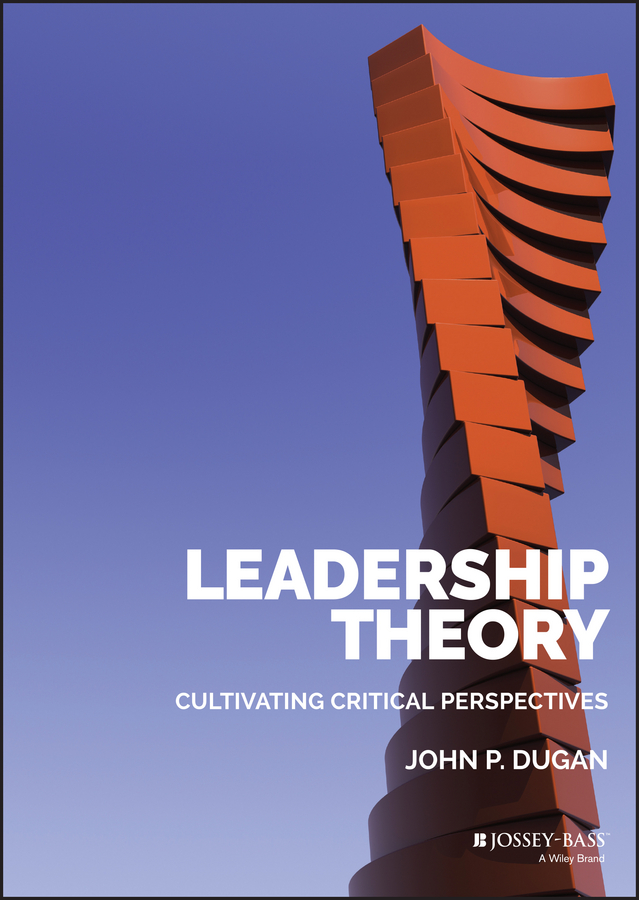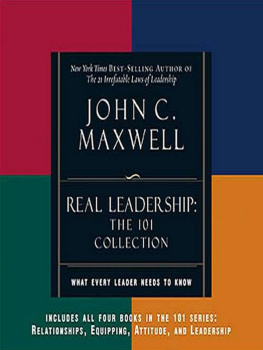John P. Dugan - Leadership Theory
Here you can read online John P. Dugan - Leadership Theory full text of the book (entire story) in english for free. Download pdf and epub, get meaning, cover and reviews about this ebook. year: 2017, genre: Politics. Description of the work, (preface) as well as reviews are available. Best literature library LitArk.com created for fans of good reading and offers a wide selection of genres:
Romance novel
Science fiction
Adventure
Detective
Science
History
Home and family
Prose
Art
Politics
Computer
Non-fiction
Religion
Business
Children
Humor
Choose a favorite category and find really read worthwhile books. Enjoy immersion in the world of imagination, feel the emotions of the characters or learn something new for yourself, make an fascinating discovery.

- Book:Leadership Theory
- Author:
- Genre:
- Year:2017
- Rating:3 / 5
- Favourites:Add to favourites
- Your mark:
- 60
- 1
- 2
- 3
- 4
- 5
Leadership Theory: summary, description and annotation
We offer to read an annotation, description, summary or preface (depends on what the author of the book "Leadership Theory" wrote himself). If you haven't found the necessary information about the book — write in the comments, we will try to find it.
Leadership Theory — read online for free the complete book (whole text) full work
Below is the text of the book, divided by pages. System saving the place of the last page read, allows you to conveniently read the book "Leadership Theory" online for free, without having to search again every time where you left off. Put a bookmark, and you can go to the page where you finished reading at any time.
Font size:
Interval:
Bookmark:

Copyright 2017 by John Wiley & Sons, Inc. All rights reserved.
Published by Jossey-Bass
A Wiley Brand
One Montgomery Street, Suite 1000, San Francisco, CA 94104-4594www.josseybass.com
No part of this publication may be reproduced, stored in a retrieval system, or transmitted in any form or by any means, electronic, mechanical, photocopying, recording, scanning, or otherwise, except as permitted under Section 107 or 108 of the 1976 United States Copyright Act, without either the prior written permission of the publisher, or authorization through payment of the appropriate per-copy fee to the Copyright Clearance Center, Inc., 222 Rosewood Drive, Danvers, MA 01923, 978-750-8400, fax 978-646-8600, or on the Web at www.copyright.com. Requests to the publisher for permission should be addressed to the Permissions Department, John Wiley & Sons, Inc., 111 River Street, Hoboken, NJ 07030, 201-748-6011, fax 201-748-6008, or online at www.wiley.com/go/permissions.
Permission is given for individual classroom teachers to reproduce the pages and illustrations for classroom use. Reproduction of these materials for an entire school system is strictly forbidden.
Limit of Liability/Disclaimer of Warranty: While the publisher and author have used their best efforts in preparing this book, they make no representations or warranties with respect to the accuracy or completeness of the contents of this book and specifically disclaim any implied warranties of merchantability or fitness for a particular purpose. No warranty may be created or extended by sales representatives or written sales materials. The advice and strategies contained herein may not be suitable for your situation. You should consult with a professional where appropriate. Neither the publisher nor author shall be liable for any loss of profit or any other commercial damages, including but not limited to special, incidental, consequential, or other damages. Readers should be aware that Internet Web sites offered as citations and/or sources for further information may have changed or disappeared between the time this was written and when it is read.
Jossey-Bass books and products are available through most bookstores. To contact Jossey-Bass directly call our Customer Care Department within the U.S. at 800-956-7739, outside the U.S. at 317-572-3986, or fax 317-572-4002.
Wiley publishes in a variety of print and electronic formats and by print-on-demand. Some material included with standard print versions of this book may not be included in e-books or in print-on-demand. If this book refers to media such as a CD or DVD that is not included in the version you purchased, you may download this material at http://booksupport.wiley.com. For more information about Wiley products, visit www.wiley.com.
Library of Congress Cataloging-in-Publication Data
Names: Dugan, John P., 1977- author.
Title: Leadership theory : cultivating critical perspectives / John P. Dugan.
Description: San Francisco, CA : Jossey-Bass ; Hoboken, New Jersey : John Wiley & Sons, 2017. | Includes index.
Identifiers: LCCN 2016044790 (print) | LCCN 2016054381 (ebook) | ISBN 9781118864159 (cloth) | ISBN 9781118864302 (epdf) | ISBN 9781118864227 (epub)
Subjects: LCSH: LeadershipStudy and teaching. | Critical theory. | Social justice.
Classification: LCC HM1261 .D84 2017 (print) | LCC HM1261 (ebook) | DDC 303.3/4dc23
LC record available at https://lccn.loc.gov/2016044790
Cover image: David Marchal/Getty Images, Inc.
Cover design: Wiley
FIRST EDITION
This book is dedicated to:
Mary Agnes Broderick, Maria Teresa Jimnez Arnau, & Kathleen Elizabeth Dugan
Leadership. Few words elicit simultaneously such a wide range of conflicting understandings and feelings. It is a concept that both provokes and appeases. It is both desired and detested. Indeed, the concept of leadership is almost impossible to escape in our contemporary context. Across nearly every form of media the terms leader and leadership are bandied about, sometimes as a clarion call for what is most absent and needed in society and other times as a harbinger of the most compelling of social ills.
Despite being almost omnipresent in contemporary discourse, so little time is directed toward unpacking what is really meant by the terms leader and leadership. We default to the assumption of a shared understanding despite clear evidence that we may be operating from different conceptualizations altogether. In our relationships, our communities, our places of worship, our work environmentsin nearly every aspect of our livesthe theme of leadership is at play. And yet to what extent do we invest in examining our assumptions, comparing our perspectives, and converging around a shared meaning.
The purpose of this book is to foster dialogue about how we understand, experience, and enact leader roles and leadership processes through the exploration of leadership theory. A remarkable gap exists between the knowledge generated from the formal, academic study of leadership and its translation into everyday practice. This is at least in part attributable to the ways in which the formal, academic literature on leadership reflects a story most often told or dominant narrative that is frequently disconnected from and/or incongruent with people's lived experiences. Thus, the focus of this book is not just on exploring the architecture that informs our understandings of leadership but also on cultivating the perspectives necessary to engage with theory as a critical learner.
The marketplace for leadership education, training, and development is growing at an exponential rate. This is evidenced in the increasing number of academic programs, community seminars, and corporate training opportunities, many of which draw on a flourishing body of scholarship on leadership theory. Leadership theory represents a particularly important area for intervention given the foundations it provides for both research and practice.
There is no shortage of books distilling the content of leadership theory. This book, however, is unique in a number of compelling ways. It offers an alternative approach to learning leadership theory that is developmental in nature and grounded in critical perspectives.
That the book is developmental means its goal is not to expose readers to the most expansive breadth of theories possible or encourage rote memorization and regurgitation. Acquisition of knowledge on a broad range of theories is important, but the process of learning how to learn about leadership theory offers greater additive value. Therefore, the organization and content of the book focuses on building readers' capacities to meaningfully interpret, evaluate, and apply theorya process that can then be replicated as new theories emerge.
Part of the developmental approach taken in this book involves the infusion of perspectives derived from critical social theory. Critical social theories are concerned with understanding the flow of power in society, how this contributes to social stratification, and ways in which we can create more democratic and equitable social arrangements. The use of critical perspectives is a direct response to scholarly calls for greater attention to issues of justice in leadership theory.
The developmental approach and integration of critical perspectives work in tandem to position readers as critical learners of leadership theory. Readers are situated as valid knowers in their own right and, through the deconstruction and reconstruction of theory, begin to craft their own theories of leadership. The goal is to build agency to transform and apply theory in ways that advance leadership that can make a meaningful difference in the world.
Next pageFont size:
Interval:
Bookmark:
Similar books «Leadership Theory»
Look at similar books to Leadership Theory. We have selected literature similar in name and meaning in the hope of providing readers with more options to find new, interesting, not yet read works.
Discussion, reviews of the book Leadership Theory and just readers' own opinions. Leave your comments, write what you think about the work, its meaning or the main characters. Specify what exactly you liked and what you didn't like, and why you think so.












